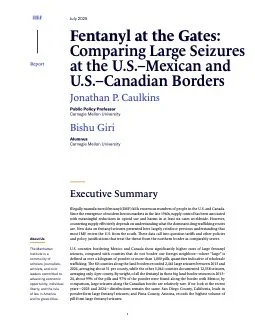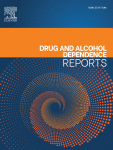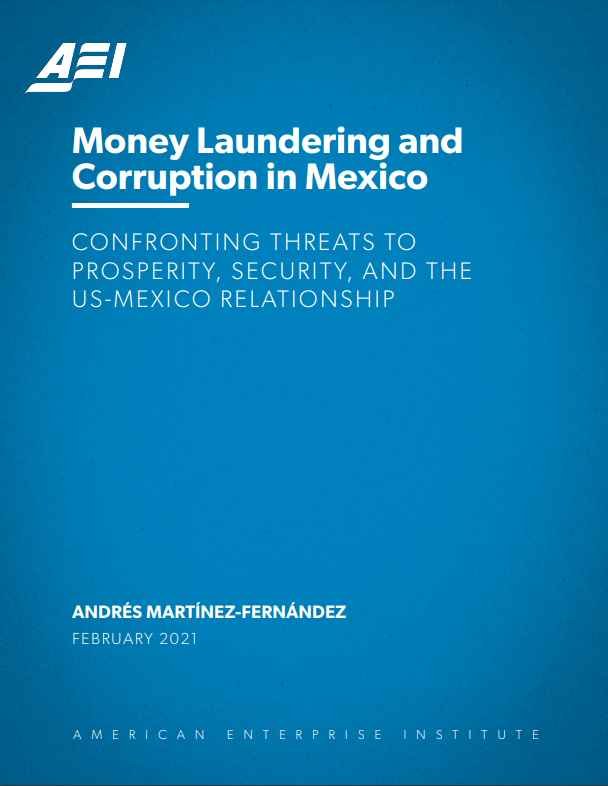By Jonathan P. Caulkins, Bishu Giri
Illegally manufactured fentanyl (IMF) kills enormous numbers of people in the U.S. and Canada. Since the emergence of modern heroin markets in the late 1960s, supply control has been associated with meaningful reductions in opioid use and harms in at least six cases worldwide. However, countering supply effectively depends on understanding what the dominant drug-trafficking routes are. New data on fentanyl seizures presented here largely reinforce previous understanding that most IMF enters the U.S. from the south. These data call into question tariffs and other policies and policy justifications that treat the threat from the northern border as comparably severe.
U.S. counties bordering Mexico and Canada show significantly higher rates of large fentanyl seizures, compared with counties that do not border our foreign neighbors—where “large” is defined as over a kilogram of powder or more than 1,000 pills, quantities indicative of wholesale trafficking. The 80 counties along the land borders recorded 2,461 large seizures between 2013 and 2024, averaging about 31 per county, while the other 3,064 counties documented 12,358 seizures, averaging only 4 per county. By weight, of all the fentanyl in those big land-border seizures in 2013–24, about 99% of the pills and 97% of the powder were found along the border with Mexico; by comparison, large seizures along the Canadian border are relatively rare. If we look at the recent years—2023 and 2024—distributions remain the same. San Diego County, California, leads in powder-form large fentanyl seizures; and Pima County, Arizona, records the highest volume of pill-form large fentanyl seizures.Drugs seized could be in transit to other places, or they might be intended for local consumption. Therefore, it is useful to contrast a county’s share of large seizures with its share of the population, which serves as a proxy for the size of the local market. Counties along the Mexican border account for only 2.35% of the U.S. population; but in 2023–24, they hosted about 40% of the nationwide quantity of fentanyl appearing in large seizures, for both powder and pills. By contrast, counties in the lower 48 states that border Canada account for 3.1% of the U.S. population but only 1.2% of the powder and just 0.5% of the pills obtained in large seizures.
To determine which counties look like import or transit centers, we developed a Disproportionality Index (DI), which compares a county’s proportion of large seizures against its proportion of the national population. On that scale, 1.0 means that seizures are proportionate to local population; below 1.0 indicates less than expected; and over 1.0 indicates more seizures than expected. Because of random fluctuations, a county can be a bit above or below 1.0, but we consider DIs above 2.5 noteworthy.
The counties with the highest DIs for 2023–24 were along the U.S.–Mexican border. For example, Imperial County, California, had a DI of 111 for fentanyl pills and 100 for powder. In contrast, in the county along the Canadian border with the greatest number of large seizures (Wayne County, Michigan, home of Detroit), the DIs were 0.5 for pills and 1.9 for powder, yielding an average DI of less than 2.0.
Only three other counties or collections of counties along the Canadian border had an average DI greater than 1. One (Okanagan County, Washington) stemmed from drugs seized from a Mexican-led organized-crime group that was supplying populations near the Canadian border. Another cluster (Juneau and Ketchikan) was suggestive of Alaska markets possibly being supplied from Canada. The third (Whatcom County, Washington) was locally significant (DI of 2.2 for powder) but small overall (Whatcom County accounted for just 0.15% of total powder seized).
Efforts to counter drug flows need to be grounded in data. The analysis here contradicts views—such as those used to justify certain tariffs—that treat the flows across the southern and northern borders as being comparably important.[1]
New York: Manhattan Institute, 2025. 15p.























